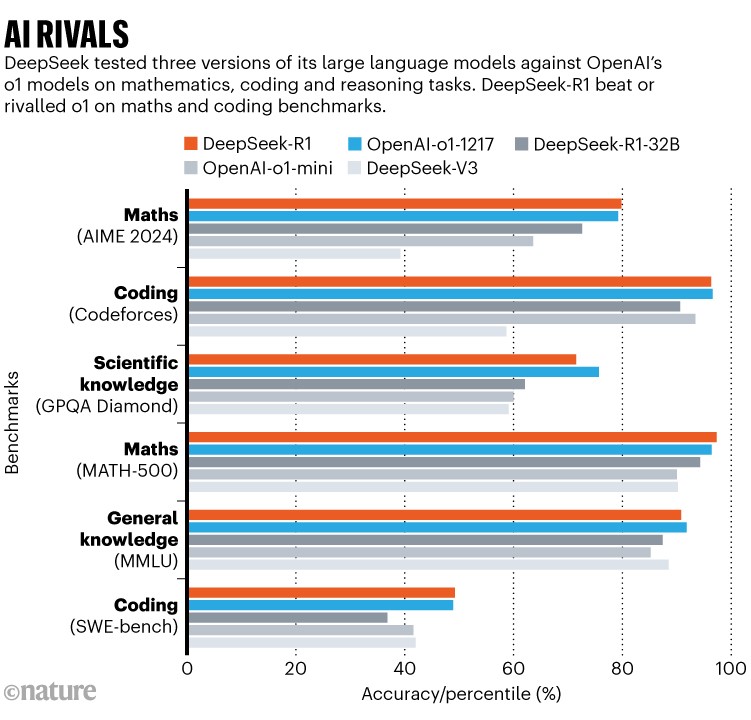Hello Nature readers, would you like to get this Briefing in your inbox free every day? Sign up here.

The US Food and Drug Administration has approved the non-opioid painkiller suzetrigine for short-term pain management. Suzetrigine is the first pain drug given a regulatory nod in more than 20 years that works through a brand-new mechanism, without the risks of addiction or sedation. Unlike opioids, the drug doesn’t act in the brain, instead blocking certain sodium channels in pain-sensing cells in the peripheral nervous system. When it comes to chronic pain — where the need for safer, non-opioid alternatives is most pressing — trials haven’t proven suzetrigine’s efficacy, nor were they long enough to rule out side effects from long-term use.
Nature | 6 min read
Go deeper into how the NaV1.8 inhibitor works in Nature Reviews Drug Discovery (11 min read)
In mice, scratching activates an immune response that helps to protect the skin against harmful infections, which could also explain why humans find a good scratch satisfying. When mice scratched itchy patches on their ears, the tissue swelled, and pain-sensing neurons released a molecule that attracts immune cells called neutrophils. Mice prevented from scratching with a ‘cone of shame’ had less swollen ears with fewer immune cells in them. Those that scratched were also less likely to have the potentially dangerous bacterium Staphylococcus aureus on their ears, which suggests that scratching has anti-bacterial benefits.
Nature | 5 min read
Reference: Science paper
Botanic gardens are running out of space — putting at risk efforts to save plants from extinction. Researchers recommend founding more botanic gardens close to biodiversity hotspots and forming a globe-spanning ‘meta collection’ to safeguard plant populations. They also flag regulatory barriers that have made it harder to collect wild specimens.
The Guardian | 4 min read
Reference: Nature Ecology & Evolution paper
An extra 2.3 million people in European cities could die as a result of extreme temperatures — both hot and cold — by the end of the century if decision makers don’t act to mitigate climate change. Researchers analysed temperature and mortality data from urban areas in 30 European countries to model various warming scenarios and the possible temperature-related deaths associated with them between 2015 and 2099. The results suggest that heat-related deaths will surpass those caused by cold conditions in even the most optimistic scenarios, and that temperature-related deaths overall could increase by nearly 50%.
Nature | 4 min read
Reference: Nature Medicine paper
Features & opinion
“It’s not unusual for an incoming administration to take a pause until they get their new people in place,” says Monica Bertagnolli, the former head of the US National Institutes of Health, of the Trump administration’s halt on some activities at the nation’s health agencies. “But what has heightened anxiety is the expressed mandate of this administration to completely overhaul health.” For example, a mooted move away from infectious-disease research in favour of more work on chronic illnesses ignores the strong links between the two. Bertagnolli’s biggest concern, though, is for the next generation of scientists. “We know that when funding is low, and when respect for science is low, that it really hurts the next generation,” she says.
Nature | 6 min read
Mod-gifted teens make their own rules in the latest short story for Nature’s Futures series.
Nature | 7 min read
In 2023, a special delivery arrived in Utah, courtesy of NASA’s OSIRIS-REx mission. Inside were samples from the asteroid Bennu, which revealed the presence of organic compounds important for life, and that its parent asteroid probably contained salty, subsurface water. The samples suggest that brines might have been an important place where pre-biotic molecules were formed. “We know that we didn’t go straight from elements to some sort of thing swimming around in a brine,” says mineral scientist Tim McCoy. “We had to form more complex organic molecules which then ultimately combined to make something that could become life and we think these alkaline brines are the ideal environment for something like that to happen.”
Nature Podcast | 35 min listen
Subscribe to the Nature Podcast on Apple Podcasts, Spotify or YouTube Music, or use the RSS feed.
Today, Leif Penguinson is enjoying a waterfall on the Chauveroche stream in the Bourgogne-Franche-Comté region of France. Can you find the penguin?
The answer will be in Monday’s e-mail, all thanks to Briefing photo editor and penguin wrangler Tom Houghton.
This newsletter is always evolving — tell us what you think! Please send your feedback to briefing@nature.com.
Flora Graham, senior editor, Nature Briefing
With contributions by Jacob Smith and Gemma Conroy
Want more? Sign up to our other free Nature Briefing newsletters:
• Nature Briefing: Careers — insights, advice and award-winning journalism to help you optimize your working life
• Nature Briefing: Microbiology — the most abundant living entities on our planet — microorganisms — and the role they play in health, the environment and food systems
• Nature Briefing: Anthropocene — climate change, biodiversity, sustainability and geoengineering
• Nature Briefing: AI & Robotics — 100% written by humans, of course
• Nature Briefing: Cancer — a weekly newsletter written with cancer researchers in mind
• Nature Briefing: Translational Research — covers biotechnology, drug discovery and pharma

